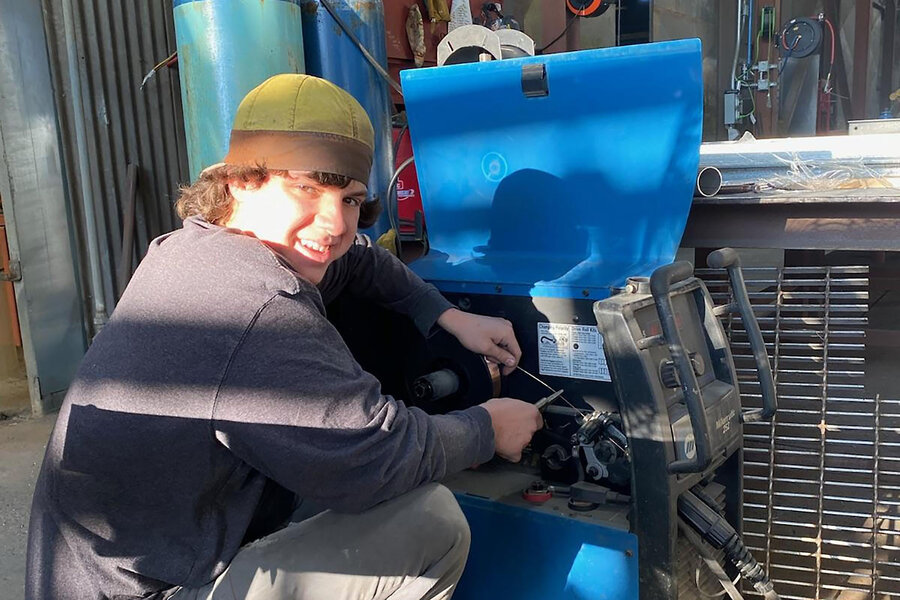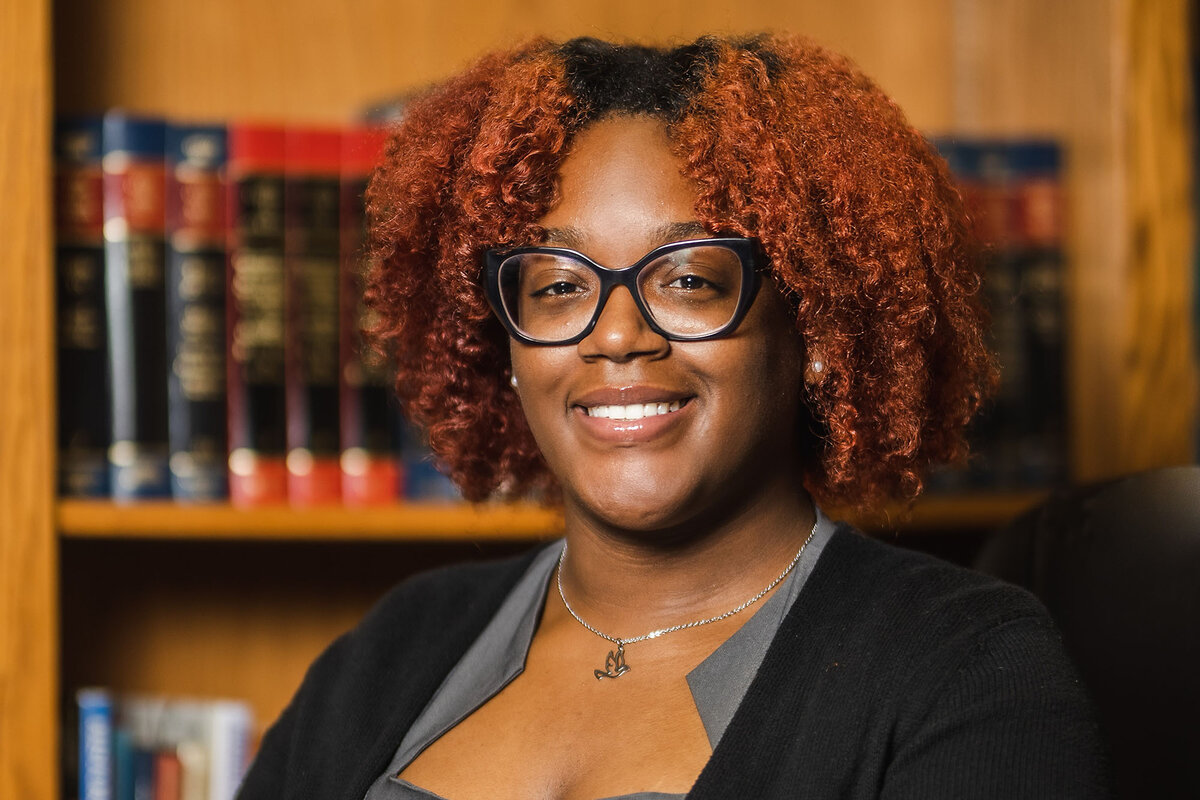He skipped a college education and didn’t regret it
Loading...
Cataldo Maria made a choice two years ago as a high school senior that shaped the beginning of his adult life. He skipped college and went to trade school for welding.
“I never really felt any pressure to go to college,” he says of his parents. “They definitely do tell me that I’m the most cost-effective one,” Mr. Maria adds with a laugh, reflecting on his sister’s costly college journey.
For Mr. Maria, the sticker price is too high and there are no guarantees of a job afterward. His 50-year-old uncle went to college and studied abroad. He is still paying off his loans. Mr. Maria even quit trade school without a certificate. Halfway through, he felt he had enough work experience, and he hasn’t regretted it.
Why We Wrote This
A story focused onTrust in the power of a college education is declining for one reason: It’s too expensive. One solution is lowering costs. But Cataldo Maria shows another way.
“I just didn’t see it being worth four years when I could be making money now,” he says.
Mr. Maria’s realization is increasingly common in the United States. From 2015 to 2023, the percentage of Americans who expressed a lot of confidence in the higher education system fell from 57% to 36%, according to a recent Gallup poll. The decrease can be seen across all ages and demographics, but it is steepest among Republicans.
Academically, the American higher education system is still routinely rated among the best – if not the best. But research shows that about 40% of students drop out within six years, and those students are more likely to default on student loans.
Mr. Maria captures America’s growing crisis of trust in higher education. As costs skyrocket, is it worth the money? For an increasing number, the answer is no.
Decades ago, college was more affordable and mainly funded by the government. “Now students and their families bear much of the burden, and that fact has changed what used to be a pretty straightforward calculation about the economic value of college into a complex math problem,” writes Paul Tough, author of “The Inequality Machine: How College Divides Us,” in The New York Times Magazine.
In researching one of his books, Mr. Tough traveled to conferences where experts said American higher education gave people the chance for economic mobility, helping lower-income families. “But a lot of the time when I would talk to individual families, they would be much more stressed,” he told a Brookings Institution panel. “They were often really concerned about the cost of college, about whether it would pay off for them and for their families.”
Finding the right fit is crucial
Not all the research is negative. Crucially, college graduates can earn significantly more during their lifetimes than those who don’t have degrees.
“On average, it seems to be that going to college is a good deal, but a lot of the ‘on average’ clause is doing some heavy lifting there,” says Jeff Denning, an economist at the University of Notre Dame in Indiana. “This doesn’t mean that it’s a good deal for everybody or that every college is a good deal or that every degree in every college is a good deal.”
What students major in and where they attend school matters. The U.S. Department of Education’s College Scorecard and net price calculators can help families calculate costs, graduation rates, financial aid, and median earnings for any school that receives federal aid, Dr. Denning notes.
“Imagine if you’re going to be a schoolteacher,” he says. Going to a state school with in-state tuition makes more sense than an expensive, selective private school, since many graduates in that line of work come out making $40,000 annually either way.
For Kailah Ross, however, college means more than just a degree. “College was the easy way out,” says the first-generation college student from West Philadelphia.
“Not only was college the smartest decision, but it was also the safest for me, because I know kids that got involved in stuff by just staying home,” Ms. Ross says. What does that bad stuff look like? “Street stuff. Early pregnancies, they got involved in stuff by just being home.”
She got a tuition scholarship to attend Benedict College in Columbia, South Carolina, which was one of 13 schools that accepted her. She took it, and after taking out $10,000 in loans for room and board for her first two years, she’s now a resident assistant in her dorm, which gives her free accommodation. She completed her first internship last summer with the Defense Logistics Agency and still works there during the school year.
A cybersecurity major, Ms. Ross wants to be an engineer. At Benedict, she is president of the golf club and on the board of her school’s chapter of the National Society of Black Engineers.
“I have created a family that I would have never known existed,” she says.
Different situations, different solutions
For Ms. Ross, American higher education has worked. The question is how to find the right fit for more people.
“We’re fixing a broken system,” U.S. Secretary of Education Miguel Cardona said at a Monitor Breakfast last fall. “Gen Z’s who attend college will probably end up with $150,000 in debt, with interest ballooning for a $40,000-a-year job. That doesn’t make sense. That’s the system we’re changing.”
To do that, Mr. Cardona says higher education has to be made more affordable. For instance, students should be made more aware of schools offering a quality education for a reasonable price. Moreover, high schools should start creating pathways to two-year and certificate programs that teach marketable skills and promise careers that make decent money. Certificates can also prepare people to attend school later in life.
Mr. Maria’s starting pay was $15 an hour. Now he makes $19 an hour, and he’ll clock over $20 an hour after his next raise. That is more than enough to cover his half of $1,300 rent for a two-bedroom apartment that he shares with a buddy. He drives a 2002 Honda Civic.
The only way he would think about getting a degree is if a company required him to have one to become a project manager.
His plan is to start his own welding business after a few years or go to work for one of the unions. Or he could become a certified welding inspector. At one career day, he met an inspector who told him he makes deep six figures without having a degree.
Meanwhile, his older sister is about to graduate from the University of Georgia with a communications degree. She might move back home if graduate school doesn’t happen. She also might have to use some of the $20,000 that their parents, both college-educated architects, saved for her brother to go to college.
“Hers is starting to run low, and they’re asking me if I mind if they borrow out of mine,” Mr. Maria says. “I’m like, ‘Well, I’m not gonna use it.’”








